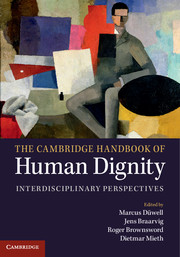Book contents
- Frontmatter
- Contents
- List of contributors
- Foreword
- Why a handbook on human dignity?
- Acknowledgments
- 1 Human dignity from a legal perspective
- 2 Human dignity: concepts, discussions, philosophical perspectives
- Part I Origins of the concept in European history
- Part II Beyond the scope of the European tradition
- Part III Systematic conceptualization
- Part IV Legal implementation
- Part V Conflicts and violence
- Part VI Contexts of justice
- 51 Human dignity and social welfare
- 52 Dignity and global justice
- 53 Human dignity and people with disabilities
- 54 Human dignity as a concept for the economy
- 55 Human dignity and gender inequalities
- 56 The rise and fall of freedom of online expression
- Part VII Biology and bioethics
- Appendix 1 Further reading
- Appendix 2 Universal Declaration of Human Rights
- Index
- References
51 - Human dignity and social welfare
from Part VI - Contexts of justice
Published online by Cambridge University Press: 05 March 2015
- Frontmatter
- Contents
- List of contributors
- Foreword
- Why a handbook on human dignity?
- Acknowledgments
- 1 Human dignity from a legal perspective
- 2 Human dignity: concepts, discussions, philosophical perspectives
- Part I Origins of the concept in European history
- Part II Beyond the scope of the European tradition
- Part III Systematic conceptualization
- Part IV Legal implementation
- Part V Conflicts and violence
- Part VI Contexts of justice
- 51 Human dignity and social welfare
- 52 Dignity and global justice
- 53 Human dignity and people with disabilities
- 54 Human dignity as a concept for the economy
- 55 Human dignity and gender inequalities
- 56 The rise and fall of freedom of online expression
- Part VII Biology and bioethics
- Appendix 1 Further reading
- Appendix 2 Universal Declaration of Human Rights
- Index
- References
Summary
The normative concept of dignity
As a strictly normative concept, dignity was introduced into moral philosophy by Immanuel Kant. It signifies an absolute value. Ultimately, a person possessing dignity must not be an offset against somebody else. She may not be sacrificed for the sake of another person or other persons. Thus, her dignity constitutes a strict limit to the actions of others. Furthermore, mutual positive duties derive from the dignity of a person. Accordingly, dignity is the basis of claim rights, since the normative concept of dignity is explicated by determinate claim rights. At the same time, one can gather from the concept of dignity how rights are to be understood as a whole, which requirements any adequate theory of claim rights must fulfil, and what the mutual duties between the bearers of dignity and rights are. The following are the four most important principles which accrue from the normative concept of dignity.
First, the normative concept of dignity is not gradable. It is impossible for one being to possess more dignity than another. Rather, all beings that possess dignity possess the same dignity and the same fundamental rights. Thus, a fundamental normative equality exists between each bearer of dignity.
- Type
- Chapter
- Information
- The Cambridge Handbook of Human DignityInterdisciplinary Perspectives, pp. 471 - 476Publisher: Cambridge University PressPrint publication year: 2014
References
- 7
- Cited by



